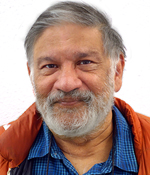
Professor V.M. Kenkre

A grant of over a million dollars has been awarded by the National Science Foundation to the Consortium of the Americas for Interdisciplinary Science at the University of New Mexico. The Consortium is a Center of UNM’s College of Arts and Sciences, directed by Professor Kenkre of the Department of Physics and Astronomy.
The mission of the Center is twofold: to bring about international collaboration of scientists in the USA with scientists from Latin America; and to perform research of the highest caliber in interdisciplinary science, with linkage to education. The Consortium started official operation on July 1, 2000 with Kenkre as its founding Director. It was made possible by the enthusiastic support given to it by many UNM officials, particularly the then Associate Provost for Research, Nasir Ahmed. In the few years of its existence the Consortium has hosted more than 30 Latin American scientists at all levels of seniority ranging from Distinguished Professors to graduate students who have spent periods at UNM varying between weeks and a year. The scientists have collaborated with their counterparts at UNM and at the neighboring laboratories in mathematical biology, condensed matter science, computationally complex systems, novel materials, and science on the nano and meso levels. These visits have also led to collaborations among the Latin American scientists themselves. Such collaborations have started at UNM and have continued after the visitors returned to their own countries.
In addition to these visits, international workshops have been arranged or supported by the Consortium at UNM and elsewhere, including in Latin America. Eighteen such workshops with strong emphasis on Latin American presence have taken place recently: 9 in the USA (New Mexico), 3 in Argentina, 2 in Brazil, 2 in Chile, 1 in Mexico, and 1 in Uruguay. Topics have ranged from granular and porous materials, and biological modeling, to Bose-Einstein condensation, and pattern formation. More than two dozen institutions from Argentina, Brazil, Mexico, and Chile, as well as participants from other countries have been involved in Consortium acitivites. A number of research publications have occurred as the result of collaborations with joint authorship of USA and Latin American scientists.
Interdisciplinary science and international collaborations characterize the Consortium. Complex systems such as those involving biology and condensed matter are at the focus of research. Consortium activities are conceived, planned, and implemented by the Consortium Director with the help of advice given by an external advisory panel of distinguished scientists of international renown as well as an internal advisory committee of UNM faculty. These activities have already put UNM’s Consortium on the international map and have made it a focus point for interactions of Latin American scientists. The Consortium is very strongly supported by the Los Alamos National Laboratory which awarded over the last 3 years Prof. Kenkre a contract for about half a million dollars for research into interdisciplinary studies of complex systems. Other sources of funding that have supported Consortium activities have been the Mexico-USA Foundation, the Office of Naval Research, and various units within UNM, particularly the Center for Advanced Studies of UNM, the Office of the Dean of Arts and Sciences,and the Office of the Vice Provost for Research, and now, most prominently, the National Science Foundation.
The NSF supported a workshop held in June 2002 in Bariloche, Argentina by awarding the Consortium a grant of $100,000. The workshop brought together participants from a number of countries of origin, and involved experimentalists and theorists, chemists, biologists, physicists and mathematicians. As a result of the success of that workshop and of the other Consortium activities, Prof. Kenkre was invited by the NSF to write a proposal for major funding for the support of the Consortium. The grant has now been awarded for the duration September 1, 2003 - August 31, 2006. Activities supported will include trimester plans of interdisciplinary projects, visits of Latin American scientists to New Mexico, international conferences, mini-workshops and lecture courses on interdisciplinary topics at UNM, and international student exchanges including a Junior Consortium Fellowship program. This will be the first international science center supported by the NSF and its further success and experienced gained in its operation will be used by the NSF for further international activities.
The Consortium has been supported strongly at all levels of UNM in keeping with one of the goals stated originally in UNM’s Strategic Plan: “…to become prominent in our Hemisphere as a University of the Americas…” through such collaborative activities. Over the years, UNM has developed strength in Latin American and Iberian Studies and has recently, under a special initiative of the Provost, created the “New Mexico Circle on Sovereignty and Sustainability”. The New Mexico Circle is envisaged as a think tank of high caliber. Consortium activities have overlap with concepts being developed in the think tank and there is potential for synergistic interactions.
For further details concerning the Consortium see http://physics.unm.edu/consort/consortium.html or contact Adriana Recalde (277-0848), the Assistant to the Director.
The University of New Mexico
Department of Physics & Astronomy
800 Yale Blvd NE
Albuquerque, NM 87131
505-277-1514
505-277-1520 fax